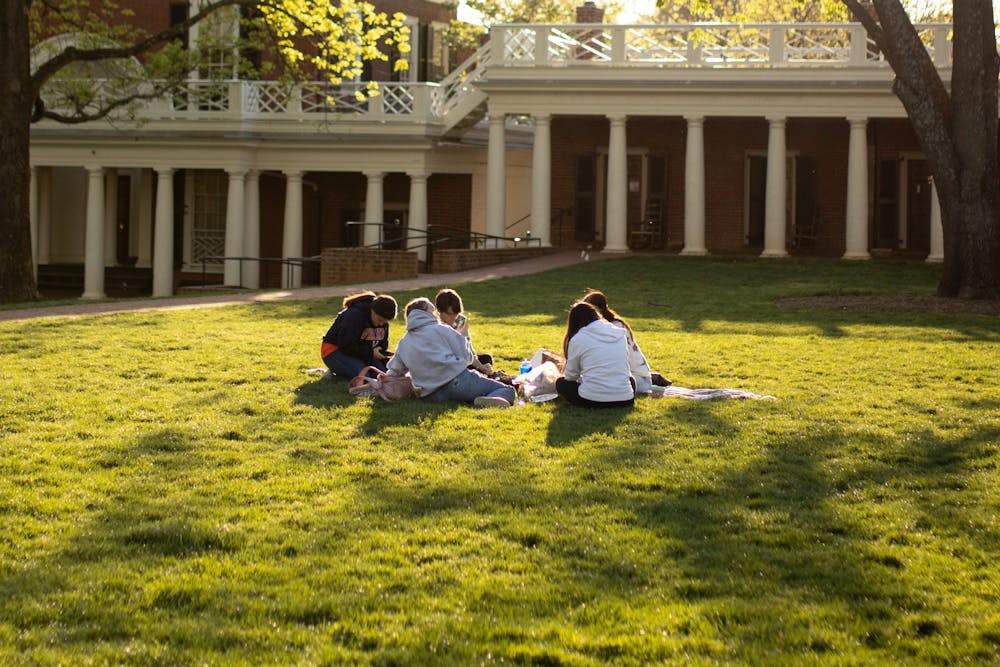The University welcomed the most diverse class of 4,000 first-year students to Grounds this year. Along with this new experience comes a surge of nerves and anticipation. Moreover, there is the challenge to find spaces in which you can be yourself, socialize with others and cope with college life. Hoos Connected offers an opportunity to combat these issues and find comfort in this recent change of environment. Unlike other courses, Hoos Connected is not taken for academic gain. Rather, it is a credit/no-credit class meant to build friendships and find one's place at the University. These small groups of six to 10 students led by two trained upper class facilitators target deep conversations and intimate relationships. So, it is essential that students take advantage of Hoos Connected in order to encourage healthy mindsets within college.
The program has certainly benefited past alumni, who have vocalized that Hoos Connected has created a place where they can be “honest and themself” in front of peers while also “encouraging vulnerability.” Studies have also shown that small group engagement improves academic achievement, enhances student relationships and promotes psychological well being — Hoos Connected has been the golden opportunity for exactly this. What's more, it has the potential to solve problems prominent among new students. A study in 2018 found that about one-third of first-year college students develop moderate to severe anxiety and depression. Hoos Connected has created a space in which students feel safe in sharing their personal experiences, promoting a healthy mindset — positively influencing on both an individual and communal level. Students should take advantage of this incredible resource when finding a sense of identity and belonging regardless of year. Up to 44 percent of college students have reported signs of depression and anxiety. This statistic includes upperclassmen, which highlights the possibility of expanding the program.
Small groups help draw out students who would typically be more shy during class participation because it prevents an intimidating classroom environment. This automatically establishes stronger self esteem for the individual and allows them to explore their boundaries when it comes to class participation. This, therefore, could improve mental health and emotional intelligence as it is creating a safe space where students feel at ease. Additionally, due to the sense of independence in college, students tend to feel isolated and lonely. According to the American College Health Association in a survey conducted in 2017, 64 percent of nearly 48,000 college students said they felt “very lonely” in the previous 12 months. Hoos Connected offers a platform for students to feel a part of a community and stave off said loneliness. This means Hoos Connected is actively contributing to creating and constructing a positive space for students.
Fieldwork has shown students tend to gravitate towards people with similar experiences which can create a barrier between them and other students on Grounds. The Hoos Connected program can be a means to bridge people of different backgrounds together. Alumni have expressed that the program has helped them, “gain a better understanding of those around them.” This encourages diversity and exposure to new perspectives. Social interaction has proven to develop social skills and improve communication. Therefore, it is crucial that said social interactions are inclusive and supportive of individuals from all upbringings. Hoos Connected establishes accessibility to forming relationships with people from all walks of life. These benefits are not at all exclusive to new students either. The reality is, college is a time for students to grow and widen their horizons. If upperclassmen were offered the opportunity to enroll, they too would be offered the opportunity to further expand their cultural awareness and find a sense of community at the University.
Considering the progress of Hoos Connected thus far, an extension of the program to third and fourth-year students would allow them to reap these benefits as well — giving students the oppurtunity to collaborate and share their experiences within their college life. Although newer students may be perceived as more of a vulnerable group, older students would have the potential to also contribute to this open and supportive environment. Hoos Connected states that its long term goal is to “make this program a focal part of the U.Va. student experience and brand, enhancing the U.Va. culture by establishing norms of connection, inclusion and support.” This can and should be a reality available to all.
I strongly encourage current first and second years, as well as transfer students, to consider enrolling in a Hoos Connected class. I urge administrators of Hoos Connected to consider expanding the program to upperclassmen because they too can benefit. It has clearly been a success thus far and truly heightened awareness regarding identities different from our own, making it incredibly valuable to all.
Leena Fraihat is a Viewpoint Writer who writes about University Life for The Cavalier Daily. They can be reached at opinion@cavalierdaily.com.
The opinions expressed in this column are not necessarily those of The Cavalier Daily. Columns represent the views of the authors alone.







